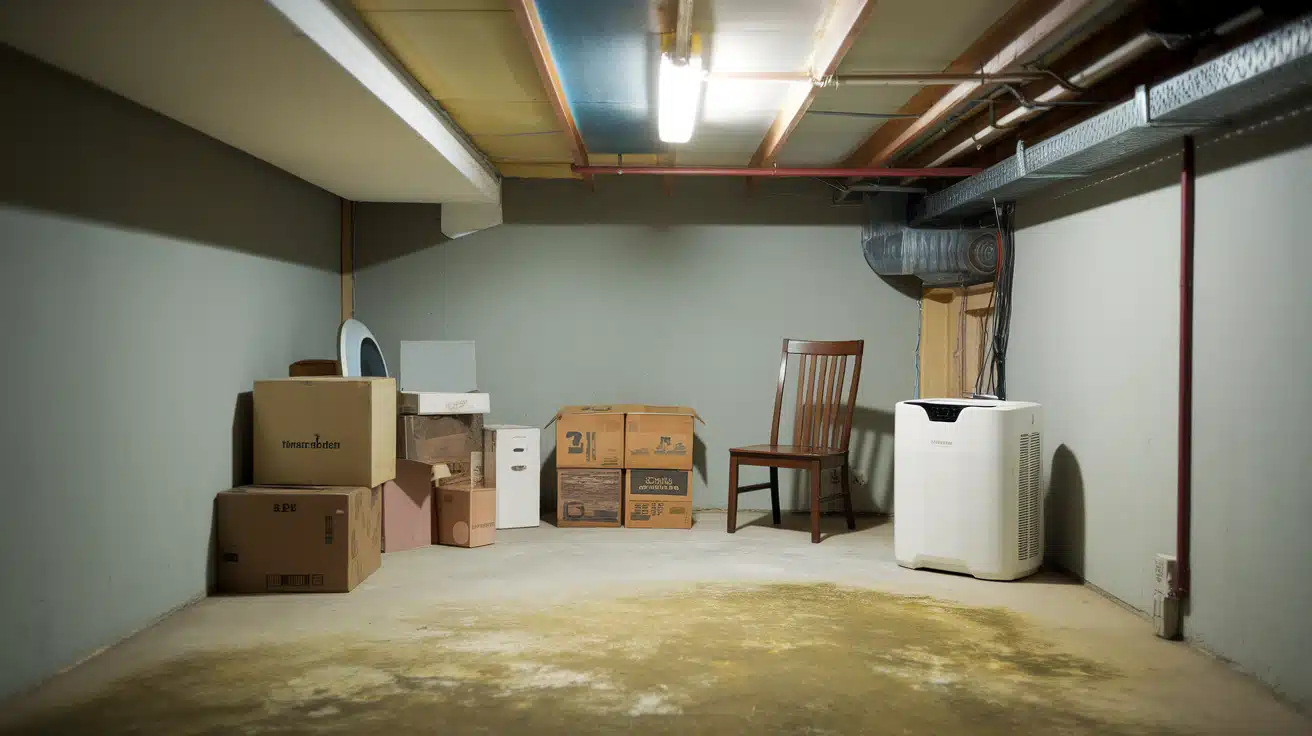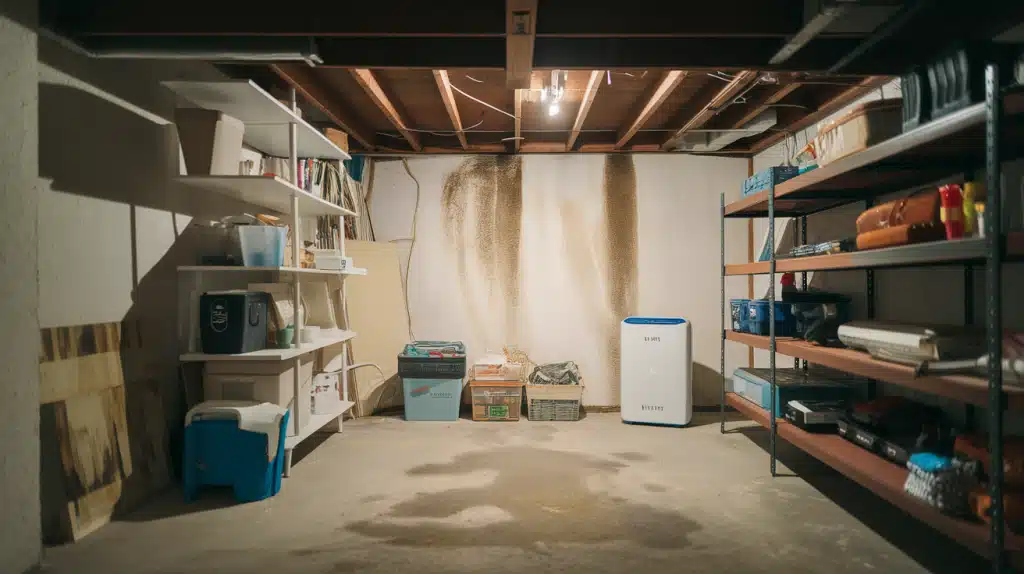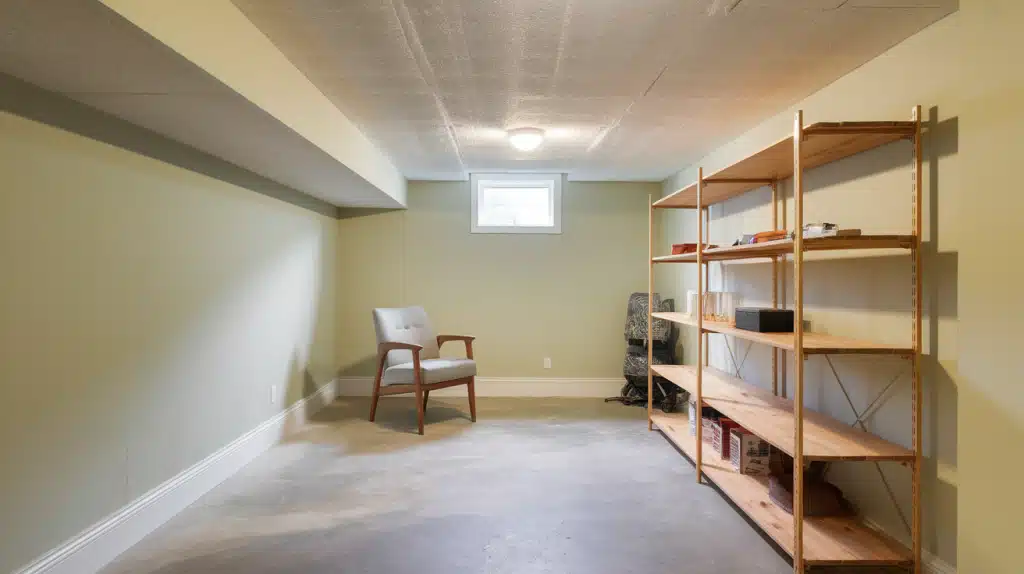Basement Smells Musty But It’s Dry? What You Need to Know
Does your basement feel completely dry, but still have that unmistakable musty smell? You’re not alone.
Many homeowners face a frustrating problem where everything appears fine on the surface.
That persistent musty odor isn’t just unpleasant; it can signal hidden moisture problems that affect your home’s air quality and your family’s health.
The smell often originates from mold and mildew growing in areas that are not visible, such as behind walls or in stored materials.
The good news? This problem is completely solvable once you understand what’s causing it. You can identify the source of these odors and take practical steps to eliminate them for good.
This guide will show you exactly how to find and eliminate musty basement smells, as well as prevent them from returning.
Why Does My Basement Smell Musty If It’s Dry?
Your basement might feel dry, but that musty smell tells a different story. Hidden moisture is the primary cause of these odors, even when surfaces appear completely dry.
Trapped humidity can accumulate behind walls, in crawl spaces, or within insulation, where it is not visible. Mold and mildew love to grow in these dark, damp spots, thriving behind drywall, in wooden beams, or on stored cardboard boxes.
Poor air circulation exacerbates the problem by allowing stagnant air to retain moisture and odors. Past water damage can also leave behind residues that continue to smell long after everything looks dry.
Even small plumbing leaks or condensation from pipes can create the perfect conditions for mold growth, producing that persistent musty odor that seems to come from nowhere.
How to Identify the Source of the Musty Odor
- Conduct a thorough visual inspection: Check every corner, wall, and ceiling for water stains, discoloration, or visible mold spots that might be causing the smell.
- Use moisture meters and humidity sensors to test wall surfaces and measure air humidity levels, identifying hidden moisture pockets that may not be visible to the naked eye.
- Check HVAC systems and air ducts: Inspect your heating and cooling vents, filters, and ductwork for mold growth or moisture buildup that could spread odors throughout the basement.
- Look for mold in hidden or hard-to-reach places: Search behind stored items, under stairs, inside utility closets, and around the foundation where mold commonly grows unnoticed.
- Detect plumbing leaks or drainage issues: Inspect all pipes, water heaters, and drainage systems for slow leaks or condensation that could lead to ongoing moisture problems.
How to Eliminate Musty Smells in a Dry Basement
Even a dry basement can smell musty. Here’s how to freshen the air and remove lingering odors.
1. Improve Ventilation and Airflow
Install exhaust fans or ceiling fans to keep air moving throughout your basement space. Add ventilation vents near the foundation to allow fresh air to enter and stale air to exit.
Use a dehumidifier to maintain humidity levels between 30% and 50%, preventing moisture buildup. Good airflow stops stagnant air from trapping odors and creates an environment where mold can’t thrive.
2. Clean and Treat Mold-Affected Areas
Mix white vinegar with water or use specialized mold cleaners to scrub the affected surfaces thoroughly. For porous materials like wood, apply the cleaner and let it sit for several minutes before scrubbing.
Always wear protective gear, including gloves and masks, when cleaning mold. After cleaning, ensure the area dries completely to prevent mold from returning.
3. Remove or Replace Moldy Materials
Remove and dispose of any drywall, insulation, or carpet that exhibits signs of mold growth. These porous materials absorb moisture and can’t be fully cleaned once mold takes hold.
Replace them with new, dry materials and consider using mold-resistant alternatives. Don’t try to save heavily contaminated materials as they’ll continue to smell and pose health risks.
4. Seal Cracks and Gaps to Prevent Moisture Ingress
Use caulk or waterproof sealant to fill cracks in foundation walls, around windows, and near pipes. Apply weatherstripping around basement doors and windows to stop humid air from entering.
Check for gaps where utilities enter the basement and seal them to prevent leaks. These small openings can allow surprising amounts of moisture to enter, contributing to musty odors.
5. Regular Maintenance Tips to Prevent Recurrence
Check your basement monthly for new water stains, leaks, or moisture problems before they become major issues. Clean gutters and downspouts to direct water away from your foundation.
Run your dehumidifier regularly during humid months and empty it as needed. Keep stored items off the floor and away from walls to allow air circulation and make inspection easier.
How to Keep Your Basement Fresh and Odor-Free
Simple tips to prevent musty smells and maintain a clean, fresh basement environment.
1. Maintain Proper Humidity Levels
Use a hygrometer to monitor humidity levels and run a dehumidifier when levels rise above 50%. Maintain humidity levels below 50% to prevent mold growth, but avoid levels below 30%, as arid air can cause other issues.
Check humidity levels weekly, especially during summer months when moisture is highest. Proper humidity control is your first line of defense against musty odors and mold growth.
2. Use Waterproofing Methods and Sump Pumps
Apply waterproof coating to basement walls and floors to prevent moisture from seeping through the concrete. Install a sump pump if your basement is prone to flooding or has groundwater issues.
Grade the soil around your foundation so water flows away from your home rather than pooling near the basement walls. These measures stop water problems before they start and keep your basement consistently dry.
3. Regular Cleaning and Decluttering
Vacuum and mop your basement floors monthly to remove dust and debris that can trap moisture and odors. Remove unnecessary items, especially cardboard boxes and old fabrics that absorb moisture easily.
Store remaining items in plastic containers with tight-fitting lids rather than cardboard boxes. Keep storage areas organized so you can easily spot potential moisture problems during regular inspections.
4. Monitor for Leaks and Fix Promptly
Check pipes, water heaters, and plumbing connections monthly for signs of leaks or condensation. Look for water stains on walls and ceilings that might indicate roof leaks or plumbing issues above.
Fix any leaks immediately, regardless of their size, as even minor drips can lead to significant mold problems over time. Early detection and prompt repairs prevent minor issues from escalating into costly remediation projects.
5. Consider Professional Mold Inspection and Remediation
Schedule a professional mold inspection if you notice persistent odors despite your best efforts. Hire certified mold remediation specialists for extensive contamination or if family members experience health symptoms.
Professional inspectors can find hidden mold in areas you might miss and provide targeted treatment plans. Annual professional inspections are worthwhile if your basement has a history of moisture issues.
Tips for a Fresh Basement: Preventing Musty Smells
- Inspect and Seal Cracks and Leaks: Check your basement walls, floors, and foundation monthly for new cracks or signs of water damage, and seal them immediately with high-quality caulk or a waterproof sealant.
- Maintain and Test Sump Pumps: Test your sump pump before each rainy season and consider adding a battery backup system to keep it running during power outages.
- Use a Dehumidifier and Monitor Humidity: Keep humidity between 30-50% using a dehumidifier and check levels weekly with a hygrometer to prevent mold growth.
- Improve Ventilation: Open windows when the weather permits and install exhaust fans in moisture-prone areas, such as laundry rooms, to keep air circulating.
- Clean and Declutter Regularly: Remove unnecessary items that trap moisture and vacuum, mop, and dust all surfaces monthly, especially corners and storage areas.
- Deep Clean and Disinfect: Scrub walls, floors, and surfaces with a vinegar solution or disinfectant every few months to kill mold spores and bacteria.
When to Call a Professional?

Call a professional when musty odors persist despite your best DIY cleaning and ventilation efforts, as this often indicates hidden mold or moisture problems that require specialized equipment to detect and treat.
Extensive mold growth covering large areas or structural damage, such as rotting wood beams, requires professional remediation to ensure safe and complete removal.
Most importantly, contact a certified mold specialist immediately if anyone in your household experiences health symptoms, such as persistent coughing, headaches, or respiratory issues, that could be related to mold exposure.
Professional contractors possess the necessary training, protective equipment, and specialized tools to safely address serious mold problems, thereby protecting your family’s health.
Summing It Up
A dry basement that still smells musty doesn’t have to be a permanent problem.
The key is understanding that hidden moisture and mold growth are usually the real culprits behind these persistent odors, even when everything appears dry on the surface.
By following the steps outlined in this guide, from identifying moisture sources to improving ventilation and maintaining proper humidity levels, you can eliminate musty smells and keep your basement fresh.
Remember that prevention is always easier than remediation. Regular maintenance, prompt leak repairs, and good air circulation will save you time and money in the long run.
Take action today to address the musty smell in your basement. Start with the simple steps we’ve covered, and you’ll be breathing easier in no time.
Frequently Asked Questions
Why Does My Basement Smell Musty, but No Moisture?
Hidden moisture trapped behind walls, in insulation, or from past water damage can create musty odors even when surfaces appear completely dry.
Can a House Smell Musty Without Having Mold?
While musty smells usually indicate the presence of mold, they can also come from bacteria, stagnant air, or moisture-damaged materials without visible mold growth.
Will a Dehumidifier Get Rid of a Musty Smell?
A dehumidifier helps prevent new mold growth by controlling humidity; however, existing mold and contaminated materials require cleaning or removal to eliminate the smell.









